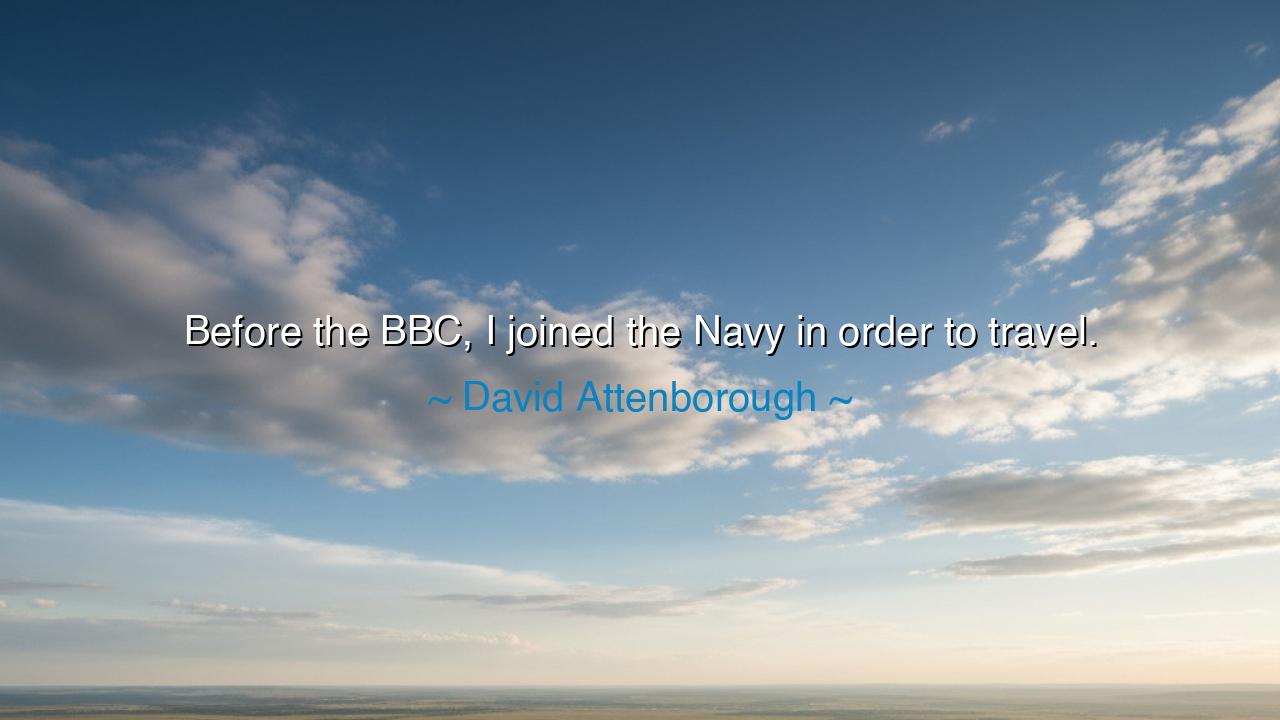
Before the BBC, I joined the Navy in order to travel.






Hear the words of David Attenborough, who revealed: “Before the BBC, I joined the Navy in order to travel.” At first this may sound like a simple confession, a step in a young man’s life before destiny revealed its true path. Yet within these words is a current of wisdom that stretches across the ages: that the longing to see the world, to step beyond the known, is often the beginning of greatness. The journey of the spirit begins not when one knows the destination, but when one dares to set sail.
The Navy, for Attenborough, was not merely a service of discipline and duty—it was a vessel to the horizon. He sought not only to serve his country, but to satisfy the ancient call of the wanderer, the voice within that whispers: “There is more beyond.” Many have heard this call, yet few have answered it. For it demands courage to leave the safe harbor of home, to face storms, separation, and the unknown. But he who answers this call finds his soul stretched wide, his vision enlarged, his destiny forever altered.
The desire to travel is not the hunger for mere movement. It is the thirst for knowledge, the yearning to touch lands unseen, to breathe new air, to hear the voices of distant peoples. For Attenborough, this desire led first to the sea, and later to the great work of his life: bringing the wonders of the natural world into the homes of millions. His path shows us that the roots of greatness are often humble. A young man joins the Navy to wander—and in time becomes the sage who speaks for the planet.
History is filled with such examples. Consider the journey of Herodotus, called the Father of History. He traveled across the ancient world, from Egypt to Babylon, gathering tales and truths, seeking to understand the vast tapestry of nations. Without his wanderings, we would have no record of the customs and wonders of those early peoples. Like Attenborough, he began as a traveler, but his travels became the foundation of wisdom that he passed to generations. Thus, the impulse to journey outward is often the seed of treasures meant for all mankind.
And so, Attenborough’s words remind us of this eternal truth: that sometimes one must leave in order to truly find. To leave one’s comfort, to leave what is known, is not loss but transformation. He did not know at the time that his course would lead him to the BBC, and through it to the voice of nature itself. But without the first step into the Navy, without the courage to answer the call of travel, the greater destiny might never have revealed itself.
The meaning is therefore both humble and heroic. Humble, because it begins in the ordinary decision of a youth to seek experience. Heroic, because from that small beginning sprang a lifetime of service to the Earth, teaching humanity to wonder, to care, and to protect. It tells us that greatness often has simple beginnings—yet those beginnings are guided by a restless yearning, a refusal to remain confined.
The lesson is clear: listen to the stirrings of your own spirit. If you feel called to travel, to seek, to wander—do not dismiss it as folly. It may be the very seed of your destiny. Practical wisdom teaches us this: when opportunities arise to step beyond your boundaries, seize them. Say yes to the road, to the ship, to the chance that will take you beyond your circle. For though you may not yet know why, the journey will shape you, and in time you may look back, as Attenborough did, and see that it was the first step toward your true work.
Therefore, children of tomorrow, remember the teaching of David Attenborough: destiny begins with a journey. Do not fear to leave the shore. For though the sea may be vast, and the road long, in leaving you may find not only the world, but also yourself. The voice of wisdom often begins with the words: “I left home, I traveled, and I was changed.”






AAdministratorAdministrator
Welcome, honored guests. Please leave a comment, we will respond soon